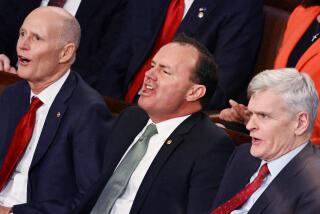Clinton Seeks to Enhance Pension Plans
- Share via
WASHINGTON — President Clinton will propose next week to bolster the nation’s private retirement programs and expand pension coverage to more workers in small businesses, the White House said Friday.
White House spokesman Mike McCurry said Clinton would propose in his State of the Union speech on Tuesday changes in individual retirement accounts, 401(k) plans and small-business “defined-benefit” plans with fixed retirement payments.
McCurry said private and individual retirement programs will be a crucial complement to the Social Security system as the nation’s population ages.
“As you think ahead to the baby boom retiring into the next century, the requirements that will be placed on the systems of support for retirement-income security extend well beyond Social Security,” McCurry said.
A draft of the proposals obtained by Reuters said the programs would cost about $869 million over five years, although cost figures are subject to revision, an administration official said.
The proposals will be detailed in Clinton’s fiscal 1999 budget request next month.
Clinton also will have “very important things” to say about the Social Security program, McCurry said.
The private pension proposal simplifies the process of contributing to individual retirement accounts through payroll deductions. It would allow the contributions to be excluded from taxable income on a worker’s W-2 form. Now the contributions are deducted from income when filing a tax return.
*
“This would be particularly helpful for low-income employees who do not file tax returns and in general would provide tax relief more rapidly than a deduction,” the draft of the proposal said.
It also would provide tax credits to small businesses that establish a retirement plan. Currently, 30 million small-business employees have no pension plan, the draft says.
The cost of the IRA changes and the tax credits was estimated at $556 million over five years.
The proposal also provides for simplified defined-benefit pension plans for small businesses, with fewer rules and regulations than existing plans, at a five-year cost of $313 million.
Defined-benefit plans, which offer retired employees a guaranteed amount of money, have faded in popularity in recent years.
Companies have increasingly turned to “defined-contribution” plans that are optional and are a worker’s own property.
In 401(k) defined-contribution plans, employee contributions are made in pretax dollars and employers can match those contributions.
“We’re doing things to really put more of the risk back onto the employer-provided system in defining a guaranteed future benefit but making it simpler for employers to provide that kind of pension plan,” McCurry said.
In addition, it would allow workers to become “vested” in any employer contributions to 401(k) retirement plans in three years instead of five, or in six years instead of seven if the plans have phased-in vesting rates.
The cost to the government would be negligible, the draft said.
More to Read
Sign up for Essential California
The most important California stories and recommendations in your inbox every morning.
You may occasionally receive promotional content from the Los Angeles Times.













